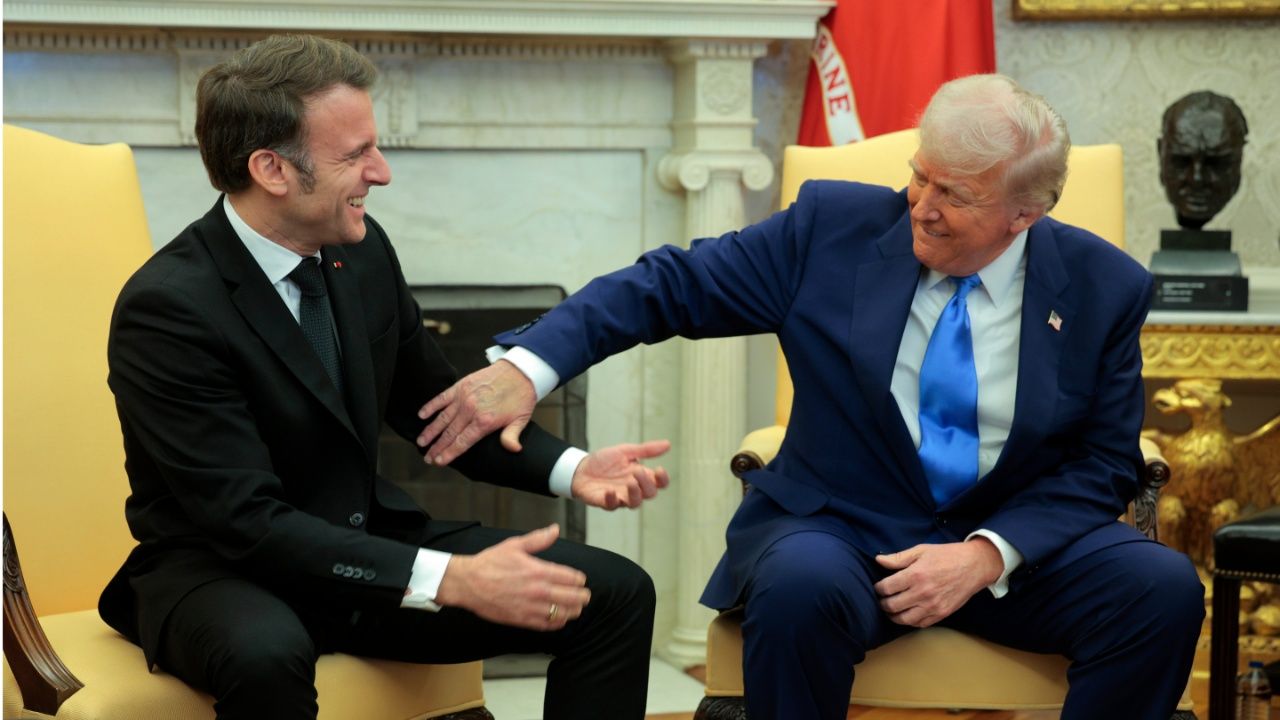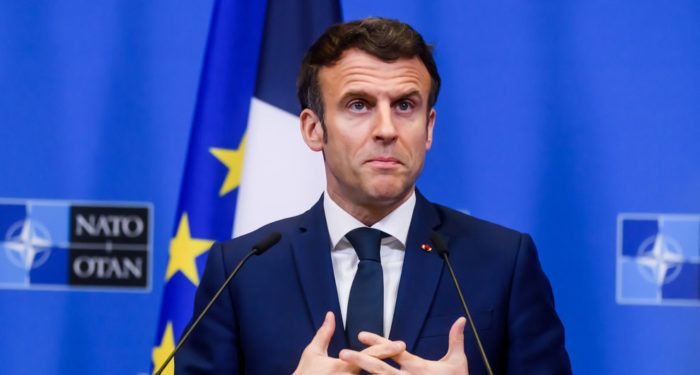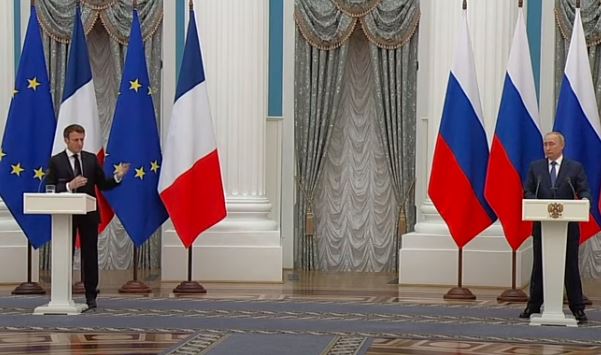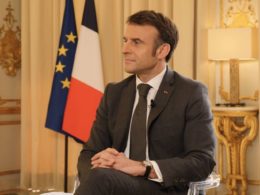If there’s a way to get to US President Donald Trump’s heart, then French President Emmanuel Macron has the map to it.
His visit to Washington, D.C., as Trump’s peace push picks up pace, has proved to be illustrative of this.
Macron’s objectives were clear-cut: one, to convince Trump that he must deliver a deal that would benefit Europe and Ukraine’s future. Two, to help Europe maintain peace as it comes to terms with putting its boots on the ground as part of the peace push. Three, to elegantly promote truths about the Russo-Ukraine war.
In some parts, he has seemingly succeeded, which became evident during the first part of their joint press conference, which brought together key government figures from both the French and the US governments, including French Prime Minister François Bayrou and US Vice President J.D. Vance.
During it, they both discussed the Russo-Ukraine war, with Trump repeating the claim that it’d have never happened if he were President and that the killing must stop.
At the same time, he gave many compliments to Macron, praising the sound of the French language that he “doesn’t understand a word of” but which is also “the most beautiful language.” He also told an anecdote about how Presidents, alongside their “wonderful wives,” dined up at the Eiffel Tower, where apparently Macron used the French language to “trick” Trump into his version of some deal. He clearly enjoyed telling the story and Macron’s alleged slyness, calling him a “smart customer.”
Even if it was fictional, Macron made sure to react to it in a delightful manner.
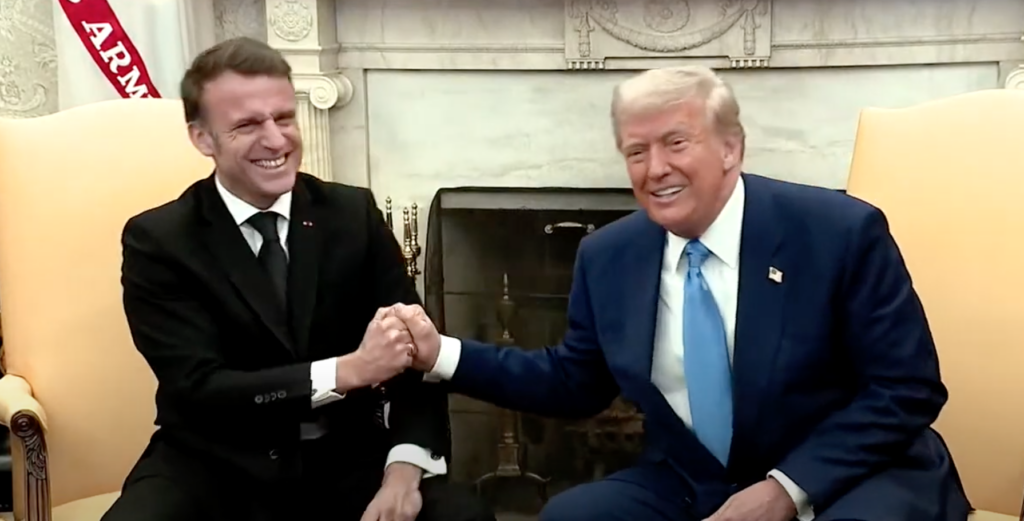
This should not come as a surprise. In the summer of 2024, Republican interviewee Steven Moore told us that Trump can be charming should he see fit and like the person he's talking to. In Macron, it could be his skills acquired following years of working in the private sector, specifically investment banking.
Meanwhile, the French President navigated the press conference smoothly, barely reacting or interrupting Trump, though there was an important exception.
This happened when Trump once again spewed out falsehoods about the aid that Europe provides to Ukraine, claiming that it comes in the form of a loan. At the same time, America reportedly writes blank checks in the amount of $350 billion, a number that his own administration has refuted, including Secretary of State Marco Rubio. Macron gently touched his hand and interrupted him: “No, in fact to be frank, we paid 60 percent of the total effort. Like the US loans, guarantees, grants, and we provided real money.”
Surprisingly, Trump did not object, made a “50-50” gesture, and even smiled, only adding that "if you believe that, it's ok with me." Perhaps because Macron made sure to reiterate several times before that Europe must step up and bear the brunt of the peacekeeping in Ukraine.
In other parts of the conversation, Trump made a number of important statements, saying that he – and Putin allegedly too – supports the deployment of European peacekeeping troops to Ukraine while confirming that they would get “some kind of backing from the US”
For Macron and other European leaders, this is a pivotal statement. While France is reportedly prepared to put boots on the ground alongside some other nations, that would be difficult and not fully credible without American support.
Russian-occupied territory has likewise been mentioned with Trump noting that he "hopes" Ukraine will be able to get some back while saying that this will be subject to negotiation and that everything remains on the table.
At the same time, he dodged the question of whether he considers Putin to be a dictator, though it would be also fair to state that at times US President calls out Russia for its invasion. This was particularly the case when he entered the Oval Office on 20 January, saying that “Russia should have never started this war” and during his recent interview with Fox News.
“The most beautiful spires in the world”
At the second press conference, Trump continued talking about the fact that this war should have never happened and would have never happened if he were President, focusing, peculiarly, not just on the people dying, but also on the churches destroyed.
This is not the first mention that Trump makes of churches, showing that they present value not just to a good chunk of his voters, many of whom are evangelical Christians, but also to himself personally.
During his first press conference with Macron, he also extensively talked about Notre Dame, claiming that in its restored version, “is even better” than in its original 12th-century version, before, in an unexpected twist, adding in the second part of it that the Russian-destroyed churches in Ukraine had “the most beautiful spires in the world.”
He also warmly addressed President Macron, recalling France's role in the US independence as well as the D-Day landing.
Trending Now
While French President thanked Trump and smiled, it in no way stopped him from pushing back against Trump who even after being fact-checked on Europe aid, continued to claim that the US provided $350 billion to Ukraine and that Europe loans money to Ukraine.
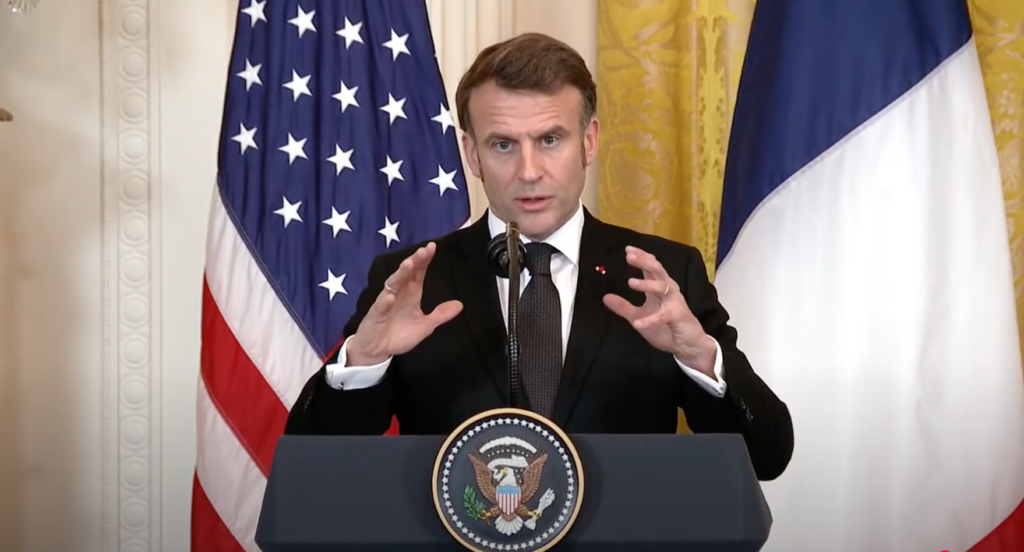
His speech, delivered in French, contained all the key points about the Russo-Ukraine war: from the fact that the war started in 2014 to the resistance of the Ukrainian people to the failure of the Minsk Accords. He reiterated that Europe is willing to be engaged and bear the brunt of war and peace, making it clear that deterrence and security guarantees are key to any Russian attempt to resume their war of aggression.
Perhaps the most peculiar part came when Macron and Trump were both asked what makes them believe that Putin is worth trusting and which advice Macron would give to Trump, to which the French President replied assertively, “I will never give any advice to President Trump.” But this statement, which was heavily flattering, was immediately coupled with Macron’s own experience of talking to the Russian ruler, which he stopped doing after the Bucha crimes were discovered and adding that he had talked to Putin extensively before the full-scale invasion and that Putin effectively lied to him 15 days before the attack.
“There was nothing to get from him at the time, now there’s a big change,” he said, adding that “there’s a good reason for President Trump to reengage with President Putin."
Trump also answered this question, saying that “all I do is deals. My whole life is deals. that’s all I know” before, in a rare admission of vulnerability, adding, “I may be wrong, but I think he wants to make to a deal.”
No magic solution
While Macron’s visit to Washington, D.C., appears to be amicable and relatively successful at first glance, it doesn’t eliminate the legitimate worries regarding the actual outcome of these negotiations, as the US made it cleat that it wants to hold them directly with Russia.
There are many rumors circulating about what is actually going on behind the scenes in those talks as opposed to what is being presented in the media. Two different, unrelated Euromaidan Press sources in Washington D.C. claimed that Trump had not had any plan when he came into the office, that his team was tasked with coming up “with some sort of solution,” and that “there’s no grand negotiation tactic either, only rage.”
The timeline for ending the war appears to reflect this whimsical approach, with the war ending “in 24 hours,” “100 days,” “180 days,” “before even entering the White House,” and “this week.”
For Ukraine and Europe, this is both good and bad news. On the one hand, Trump is transactional and adheres to a vision of realpolitik where only big powers matter. In this playbook, Ukraine plays very little, if no role after surrendering its nuclear arsenal in exchange for the Budapest Memorandum which Trump doesn't respect.
Europe, however, does, which explains its search for leverage in these negotiations and the floating of the idea of using the frozen Russian funds mostly held in Brussels. This idea is supported by Ukraine's strongest allies like Baltic and Nordic countries, Poland, Czechia and the EU’s top diplomat, former Estonian PM, Kaja Kallas.
Yet, it is met with opposition with Macron himself though he did mention during his press conference with Trump that this money can be used as a bargaining chip in the negotiations.
This subject will likely be brought up during an urgent video call where Macon will debrief EU leaders on his meeting with Trump right before UK PM Keir Starmer travels to Washington D.C. and US-Russia holding another round of talks, making it a busy week for international politics.

